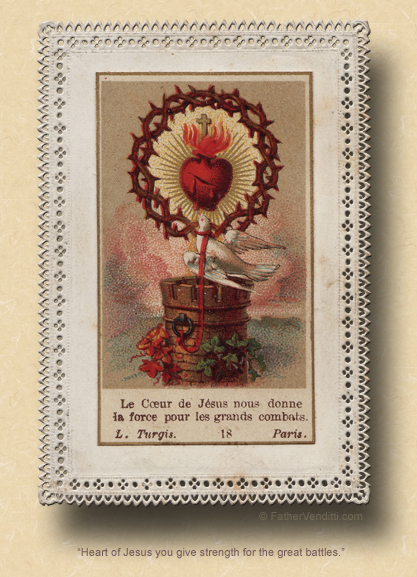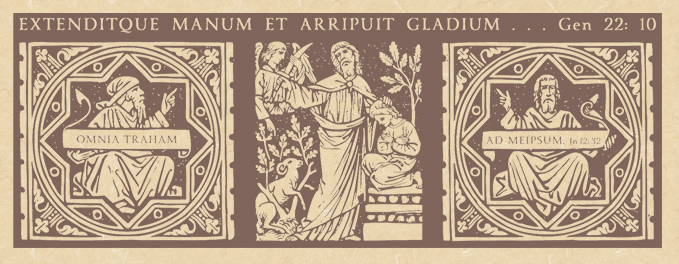Jesus and Elvis … NOT.
The Twenty-Seventh Sunday of Ordinary Time.
Lessons from the tertiary dominica, according to the ordinary form of the Roman Rite:
• Habakkuk 1: 2-3; 2: 2-4.
• Psalm 95: 1-2, 6-9.
• II Timothy 1: 6-8, 13-14.
• Luke 17: 5-10.
The Twentieth Sunday after Pentecost.
Lessons from the dominica, according to the extraordinary form of the Roman Rite:
• Ephesians 5: 15-21.
• Psalm 144: 15-16.
• John 4: 46-53.
The Twentieth Sunday after Pentecost; the Feast of the Holy Bishop & Martyr Cyprian; the Feast of the Holy Martyr Justina; and, the Feast of the Holy Andrew, Fool for Christ.*
First & third lessons from the pentecostarion, second & fourth from the menaion for the Bishop, according to the Ruthenian recension of the Byzantine Rite:
• Galatians 1: 11-19.
• I Timothy 1: 12-17.
• Luke 6: 31-36.
• John 10: 9-16.**
FatherVenditti.com
|
 8:03 AM 10/2/2016 — It may seem on the surface that the virtue of Faith is the subject of today’s Scripture lessons, but only by association; the real focus is the virtue of Hope. The Prophet Habakkuk complains to the Lord about the apparent triumph of evil over good, and laments the mistreatment of the chosen people by invaders who flaunt their scandalous behavior. 8:03 AM 10/2/2016 — It may seem on the surface that the virtue of Faith is the subject of today’s Scripture lessons, but only by association; the real focus is the virtue of Hope. The Prophet Habakkuk complains to the Lord about the apparent triumph of evil over good, and laments the mistreatment of the chosen people by invaders who flaunt their scandalous behavior.
How long, O Lord? I cry for help but you do not listen! I cry out to you, “Violence!” but you do not intervene. Why do you let me see ruin; why must I look at misery? (Hab. 1: 2-3 RM3).
And there in the Prophet’s words you have every third confession I’ve ever heard as a priest: “I’ve lived a good life. Why is God letting this happen to me? Why hasn’t He heard my prayers?” And God answers the Prophet with a call to patience and hope, and a reminder that the day will come when evil will be punished and the righteous will triumph; it’s just not our right to know when or how.
The Blessed Apostle Paul, in our second lesson, writes to his young friend, Timothy, not to give in to cowardice, to stand firm in the face of opposition. He made Timothy Bishop of Ephesus some time before, but the Ephesians rejected him because they thought he was too young and inexperienced for the job; and, Timothy himself wonders if they might be right, as he is worn down by their constant criticisms, their disobedience and lack of cooperation. Paul exhorts him to remember that he’s been consecrated a bishop by the laying on of hands, and that the grace of that sacrament will see him through, but only if he keeps faith.
And our Lord Himself in our final lesson, with another of His cryptic allegories: “If you had faith the size of a mustard seed, you would say to this mulberry tree, ‘Be uprooted and planted in the sea,’ and it would obey you” (Luke 17: 6 RM3). No disrespect intended to our Lord, but I’ve tried it; it doesn’t work … unless, of course, I don’t have faith the size of a mustard seed, which is altogether possible, I suppose.
The lessons of today’s Mass are really an epilogue to what was being read all week at the daily Mass. For those who don’t assist at Mass every day, the first lessons this week—many of them—were taken from the Book of Job, the whole of which is centered on this very question: why do bad things happen to good people? Job never gets an answer to his question, nor does he give one. He goes as far as he can to explain to his friends why he continues of have faith in God in spite of all the horrible things that have happened to him; and, as we read though it and hear Job’s sometimes moving, sometimes comic, answers to his friends arguments, our excitement builds as we anticipate a grand resolution which will finally, once and for all, answer this universal question; but, when we finally get to the epilogue, we’re disappointed to learn that the answer never comes.  Part of the reason for this we touched on two weeks ago when we were looking at two other books which form what is called the “Wisdom Literature” of the Bible, of which Job is a part: the Jewish people had no concept of an afterlife until the advent of the Pharisees some sixty years or so before the time of our Lord, so the idea that we suffer in this world in order to be rewarded in the next is an insight that escapes Job. The conclusion to the book of Job, in which Job has everything he’s lost restored to him, is a deus ex machina which gives the impression that all we have to do is persevere in faith and everything will end up OK. At no time does the book even attempt to actually answer the question posed at the beginning. Part of the reason for this we touched on two weeks ago when we were looking at two other books which form what is called the “Wisdom Literature” of the Bible, of which Job is a part: the Jewish people had no concept of an afterlife until the advent of the Pharisees some sixty years or so before the time of our Lord, so the idea that we suffer in this world in order to be rewarded in the next is an insight that escapes Job. The conclusion to the book of Job, in which Job has everything he’s lost restored to him, is a deus ex machina which gives the impression that all we have to do is persevere in faith and everything will end up OK. At no time does the book even attempt to actually answer the question posed at the beginning.
Long time visitors here to the Shrine might remember a series I preached a couple of years ago when we compared Job to the Prophet Jonah. Both men are presented to us as polar opposites: Jonah is a bitter and angry man, and Job is a pious innocent; both men suffer great loss and have bad things happen to them, but they react in totally different ways. Jonah, in his bitterness, won’t talk to God and cuts off all contact with Him, even when God tries to reach out to him in the end, and the book ends with Jonah estranged from God; Job never stops praying, and ends up having everything restored to him. In fact, Job’s statement of faith in the first chapter is almost impossible to comprehend given the fact he doesn’t believe in an afterlife:
Naked came I out of my mother’s womb, and naked shall I return thither: the Lord gave, and the Lord hath taken away: as it hath pleased the Lord so is it done: blessed be the name of the Lord (Job 1: 21 Douay-Rheims).
That is simply not a faith to which any of us can relate without some concept of a resurrection from the dead.
I hate to sound like a broken record, but how many times must it be said? Of all the themes upon which our Blessed Lord touches in the Holy Gospels, this is the one of which He speaks most frequently, which is always constant and never changes: that reward and punishment do not happen in this life, but in the next! If you can’t live with that, then you need to go and find yourself another religion, because Christianity is not for you.
We keep wanting to view our Blessed Lord like some schmaltzy painting on black felt which we have hung next to our Elvis on black felt. I’ve actually seen that, by the way, in someone’s living room: an effeminate-looking Jesus on black felt next to an Elvis on black felt. The Jesus on black felt looks like a girl because that’s how some people have completely reinvented our Lord: a mild, meek milquetoast who requires nothing, and whose sole purpose is to kiss our boo-boos and make them feel better. The real Jesus is the one we read about in the Gospels, the one who says, in today’s Gospel lesson:
Does [the master] thank the servant because he did what was commanded? So you also, when you have done all that is commanded you, say, “We are unworthy servants; we have only done what was our duty” (Luke 17: 9 RSV).
And what is our duty? To obey the Commandments, to live the Gospel, to admit to our sins when we fall and seek out our Lord’s absolution in confession, and to steal ourselves against further sin and temptation through the grace of the sacraments until that day that we are called home to the Lord to enjoy the reward that awaits us in heaven. Or, as the Baltimore Catechism so correctly put it:
Q. Why did God make you? A. God made me to know Him, to love Him, and to serve Him in this world, and to be happy with Him for ever in heaven (Balt. Cat. 1, q. 6).

* The lives of the Holy Hieromartyr Cyprian and the Virgin Justina are linked: Cyprian, a pagan magician, had used all his tricks to attempt to seduce Justina but, touched by God's grace, he embraced the faith, and was baptized by Anthimus, Bishop of Antioch. He burned all his books of magic and became a priest, then a bishop, and received Justina into the ranks of consecrated virgins. Both were martyred together in Nicomedia by order of the Emperor Diocletian in the year 304.
Andrew was born a Scythian and came to live in Constantinople as the slave of Theognostus, a protospatharios ("first sword-bearer," an honorific title) to Emperor Leo VI the Great (886-912). He was also the spiritual child of Nicephorus, a priest at Hagia Sophia during that time. Seeming to be insane, Andrew was brought to the Church of St. Anastasia for his care. There St. Anastasia appeared to him in a dream and encouraged him to continue his ascetic feat of feigning madness. He was driven off the church property because of his faked madness and had to live on the streets of the capital city, hungry and half-naked. For many years the saint endured mockery, insults, and beatings. He begged for alms, then gave them away to the poor. The beggars to whom he gave his last coins despised him, but Andrew endured all his sufferings humbly and prayed for those who hurt him. While praying at the Blachernae church, it was St. Andrew who, with his disciple, the Blessed Epiphanius, saw the Most Holy Mother of God, holding her veil over those praying under her Protection, thus becoming a central figure in the establishment of the Feast of the Protection of the Theotokos. He lived and died in the tenth century.
** In the Churches of the Byzantine Rite, the "Lucan Jump" is in effect for this and the following Sundays. Cf. the second footnote attached to the post here for an explanation.
|

